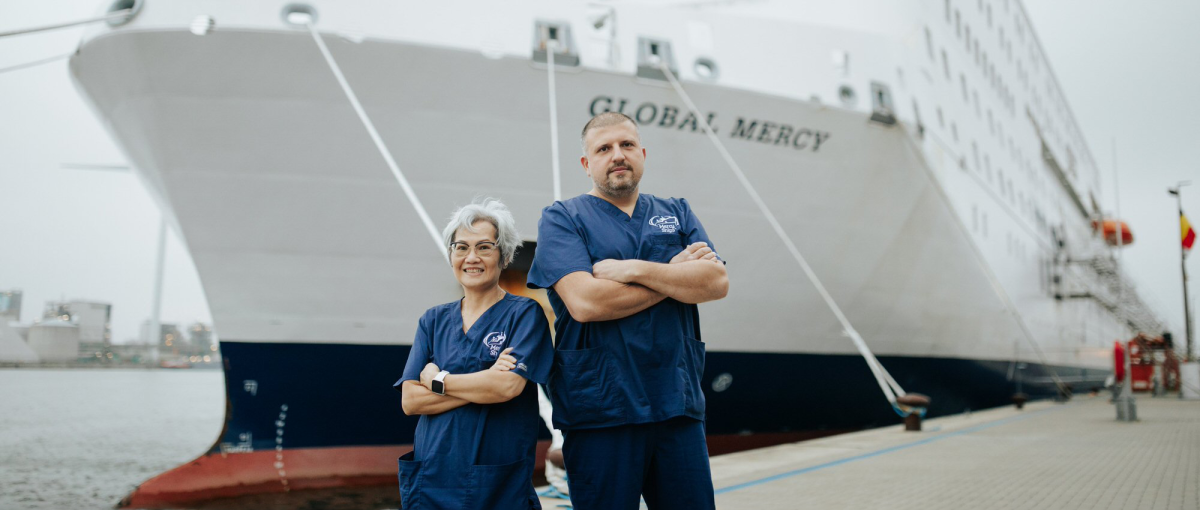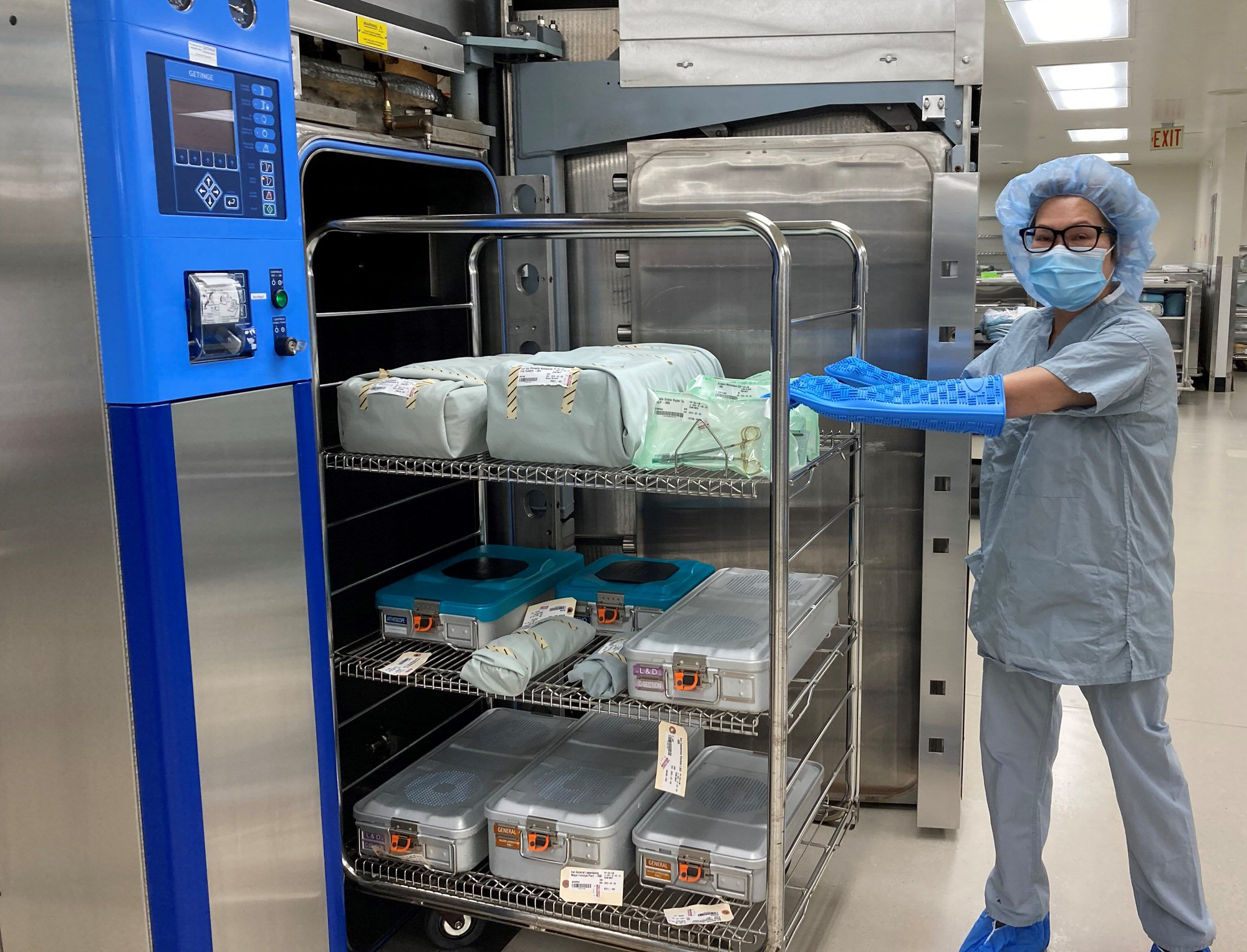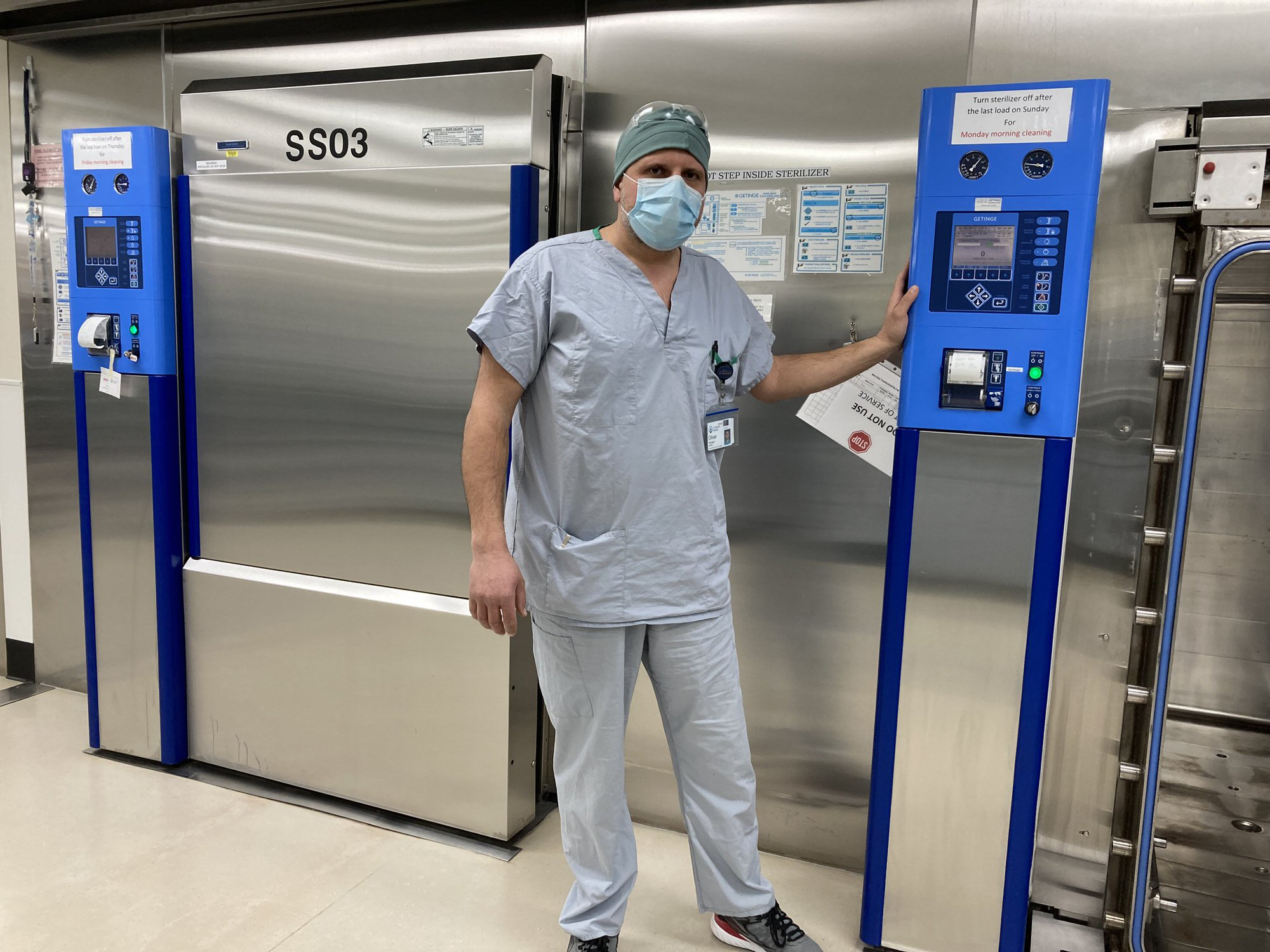Volunteering for hope and healing
Medical device reprocessing staff help to equip new hospital ship for field service

April 20, 2022
By Marguerite Watson, Senior Communications Advisor, Covenant Health
After Lan Nguyen and Oliver Etcu returned from 10 weeks of volunteering on the Global Mercy earlier this year, they immediately signed up for another volunteer stint. The two are using their extensive experience as part of the medical device reprocessing department (MDRD) at the Misericordia Community Hospital to set up a sterile processing department on the ship.
“I want to do whatever I can to help, so when I had the opportunity to do that and do what we’ve been doing here for years, I went to help out,” says Lan, a former supervisor with the MDRD who is now retired and works casual shifts at the Misericordia.
“Between Lan and me, we have 55 years of experience. And so it is a great way of giving back and putting some of that knowledge to a good use, to bring hope and healing to people who otherwise would not have a chance at it,” says Oliver, who is leaving his position as the manager of the MDRD at the Misericordia to volunteer for a longer term aboard the Global Mercy.
The Global Mercy is a new hospital ship being equipped for field service by Mercy Ships, an international non-governmental organization that offers free surgical, dental and eye care as well as medical training across West and sub-Saharan Africa.
The sterile processing department Lan and Oliver are developing will support the operating rooms as well as all the other hospital units on the ship. They are in charge of creating instrument sets — correctly positioning each piece — photographing the sets and itemizing them in a new instrument tracking system, the first for Mercy Ships. They are also setting up the policies and procedures along with the workspace and workflow for the department and commissioning all the washers and sterilizers for reprocessing the instruments to the highest North American standards once they are in use.
The need for accessible health care in West and sub-Saharan Africa is great. Research estimates that about 93 per cent of the population, or more than 5 billion people, cannot afford medical care or live too far away from a hospital to get treatment. The direct medical services — women’s health, palliative care, dental care, eye care and surgeries to correct deformities and treat other conditions — that Mercy Ships offers are often the only such care people may receive.
“What we can heal with a simple procedure here in North America, for them it’s a lifelong illness, such as blindness,” says Oliver. “Once the ship reaches Africa, it will change many, many lives.”
Over the last 40 years, volunteers have performed more than 105,000 surgeries aboard Mercy Ships vessels. A year before arriving for field service in a country, a team of healthcare professionals travels from village to village to screen people and determine who needs care the most. Patients are prepped for surgery at a Hospital Out Patient Extension (HOPE) Centre near the ship, or they are brought on board for diagnostic imaging, blood work and other pre-surgery procedures. After surgery, they stay at the HOPE Centre or on the ship with a family caregiver to look after them until their scars have healed and they’ve received follow-up care such as rehabilitation, physiotherapy and patient education.
“We can see that people there really appreciate whatever we do for them,” says Lan, who also volunteered on a six-week field service with Mercy Ships in Guinea in 2019 and witnessed first-hand the impact treatment can have. People who have a serious health condition or are disfigured by a tumour or other deformity may be shunned by their family and village. Getting treatment may mean they are able to go to school, work and be part of the community.
“After surgery, they’re still disfigured. They still have big scars, but, in comparison, what they had to carry before was more pain,” says Lan.
Sometimes the impact of receiving medical care is multigenerational. Lan and Oliver recall hearing about a family whose mother had surgery for cataracts on the Anastasis, the first ship in the fleet. Several years later, her three children were brought on board the Africa Mercy to receive the same treatment. The surgery has given them a chance to live a normal life, says Oliver.
In addition to being equipped to provide patients with full hospital care — diagnostic imaging, physiotherapy, rehabilitation, surgery and so on — the Global Mercy has a classroom and simulation rooms for educating healthcare professionals at the destinations it visits in collaboration with local governments and other partners. The training provided will help to build medical capacity and strengthen healthcare systems in the region so that, eventually, support from Mercy Ships is no longer needed.
Lan and Oliver will resume their work on equipping the sterile processing department when they return to the Global Mercy this spring. Once the department is set up, they’ll focus on developing education, training and orientation materials to help prepare future volunteers for their service.
“Having this opportunity to contribute, to be able to eventually change lives, even if it’s one life at a time, we are just honoured to be part of that,” says Oliver.

Lan unloading the sterilizer at the Misericoridia Community Hospital

Oliver beside the sterilizers at the Misericordia Community Hospital